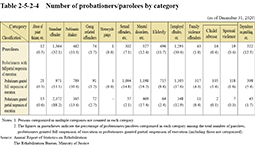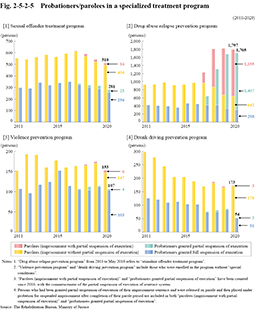2 Treatment during probation/parole
(1) Discontinuation of graduated treatment and implementation of assessment-based probation/parole supervision
The graduated treatment that had previously been provided was a system in which probationers/parolees were categorized into four levels according to their progress in their reformation/rehabilitation, probability of repeat offenses, necessity of guidance and assistance, etc., and treatment with different levels of involvement and frequency of contact by probation officers was implemented according to each stage. However, with the implementation of probation/parole supervision based on assessment utilizing CFP (Case Formulation in Probation/Parole), which is an assessment tool to provide more effective guidance and support for probationers/parolees in preventing repeat offenses, the graduated treatment was terminated in January 2021.
The CFP assessment tool, which had been in a test phase since October 2018, identifies the factors that lead to offenses and delinquencies or promote the reformation/rehabilitation of probationers/parolees in eight categories: family, friendship, employment/school, substance use, leisure activities, economic status, criminal history, and mental health. This tool helps officers consider the process leading to crime or delinquency by analyzing and showing the interaction and causal relationship of each factor. In implementing probation/parole supervision based on the assessment, the risk of repeat offenses or repeat delinquencies is assessed with CFP, and probationers/parolees are assigned to one of five treatment levels. The degree of involvement, frequency of contact, etc. of probation officers differ according to the treatment levels determined by the factors the assessment revealed as possible problems towards rehabilitation.
(2) Treatment in accordance with problems
Categorized treatment means to categorize problems and other characteristics of persons under probation/parole supervision according to their offenses/delinquency. And it aims to efficiently treat them by focusing on those problems so as to provide effective probation/parole supervision.
Table 2-5-2-4 shows the number of probationers/parolees by category in 2020.
Table 2-5-2-4 Number of probationers/parolees by category
Click here for the Excel file (Japanese)
Persons under probation/parole supervision who have specific criminal tendencies are provided in a systemized manner, as a part of instruction and supervision, with specialized treatment programs, which are built upon psychological and other expertise with cognitive behavioral therapy as a base theory.
Fig. 2-5-2-5 shows the trend in the number of probationers/parolees who participated in specialized treatment programs.
Fig. 2-5-2-5 Probationers/parolees in a specialized treatment program

